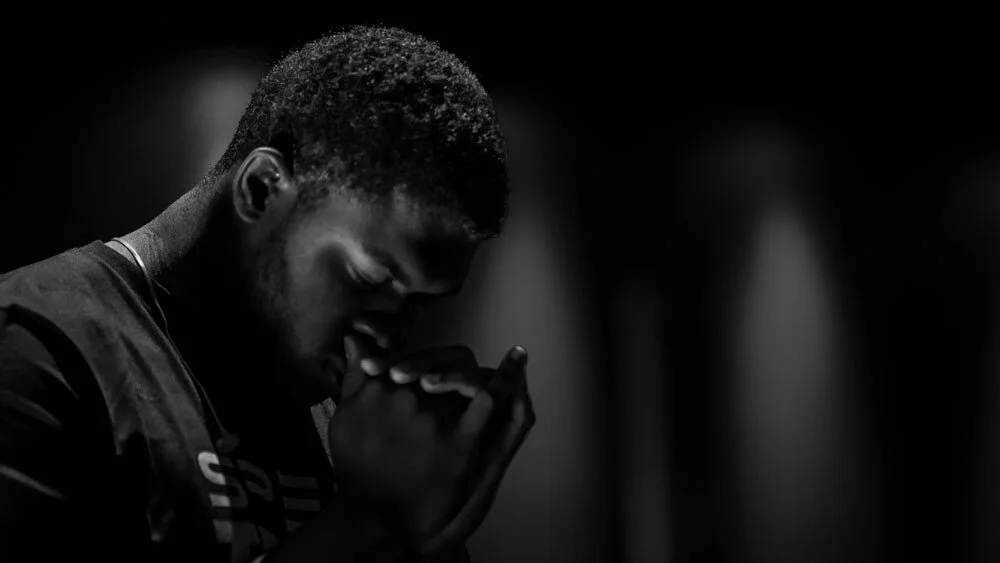When something goes wrong, we’re quick to blame ourselves or others or God. We assume that trials must be punishments and we try to evaluate them to see whether they’re fair. Jesus shows us that punishment often isn’t the purpose at all. He points to God’s good purposes even in tragedy and shows us how to understand God’s working in our lives.
John 9:1-12 // [outline]
It’s easy to be weighed down by bad news and disappointment. We can complain about the bad stuff and be complacent about the good stuff. This psalm teaches us how to find our joy in God no matter what we’re facing.
Our ability to cope with difficult and painful circumstances will be tested over the course of this pandemic. We’ll likely face times when our strength seems to fail and the answers to prayer that we had hoped for don’t come. This message looks at some practical steps we can take when it feels like the world is against us.
Guilt has a way of gnawing at your peace and shame can tear down your self-confidence. And our most instinctive reactions, denial and escape, can dull the effects for a while but don’t really solve anything. According to the Bible, the only lasting solution is found in the forgiveness and grace of God. This message looks at how to come clean with God in a way that positions us to receive His forgiveness.
Easter for many people is a celebrated holiday and a family tradition, but according to the Bible it is central to the Christian faith. Even for people who love to celebrate Easter, it’s easy to miss the implications of Jesus’ resurrection. This passage considers how Easter ought to define our faith and shape how we live.
Romans 10:5-13 // [outline]
The final scene and often the closing words are crucial in understanding any story. The same is true of Jesus. The last words that He uttered on the cross give us an essential understanding of what He came to do. Many people misinterpret Jesus because they don’t take His final words seriously. And even those who do understand Jesus rightly often don’t connect what He accomplished with how we are freed to live. Join us Good Friday for an examination of the meaning and implications of Jesus’ final words on the cross.
John 19:28-30
Stress brings out the worst in all of us. While we’re all affected by COVID-19 differently, most of us are experiencing added pressure. We will either turn to God for relief or something else. What we place our hope in is critical. According to the Bible, worship is the act of declaring our hope and identifying our ultimate allegiance. This message looks at how to worship God in a pandemic and find relief from the false hope that we might otherwise trust.
Psalm 115 // [outline]
People keep describing the COVID-19 pandemic as unprecedented. While our times are unprecedented in one sense, you don’t have to look far back in history to see examples of people who have faced similar situations. This psalm looks at a person who dealt with the pain of isolation and it gives some warning signs to look for as well as some steps that we can take to cope with quarantine.
How do you feel thinking about or preparing for worship? Excited, exhausted, conflicted? Today we will turn to Psalm 135 and be reminded that no matter what is going on in our lives or in the world, God is always worthy to be praised!
COVID-19 has put everyone on edge. While we all work to take necessary precautions, many feel a sense of panic as well. The greatest example of this has been the mad rush to stockpile toilet paper. The Bible promises confidence in God, but many are unsure of how to lay hold of it. This message looks at a psalm of David where we learn some practical steps we can take to overcome our anxiety and find confidence in troubling times.
Many books and movies tackle the theme of coping with hardship. Usually, the take-away is that human willpower conquers all adversity. But most of us have come to learn that willpower has its limits. If we think that God might help, then we often struggle to understand how. This message looks at specific steps we can take to find hope in circumstances that feel hopeless.
Some of the prayers in Scripture sound like the bartering in a Middle Eastern market. There's a back and forth that seems deliberate and intentional. Today's message looks at one such 'prayer negotiation' between Moses and God. And it shows us that sometimes God tests us in prayer to see what we'll settle for. His hope is that we won't settle until we've seen His glory.
Sometimes life can feel as if it’s cursed. We look around at how easy things come for other people and it feels as if we’re being left behind. We’re on the B team, forever sitting on the bench, never able to play. The Bible presents a prayer of someone who was made to feel like he was on the B team. And God’s answer to that prayer gives us hope for what God could do in our lives.
1 Chronicles 4:9-10 // [outline]
Parents are busier and more stressed than ever. But in our race to help our children lead happy, successful lives, we can lose sight of what’s most important. This message looks at a simple prayer for parents and what it can teach us about how to pray for our parenting and see the role that God has given us through His eyes.
Passages like the Lord’s Prayer can teach us what God wants us to pray about, but we can still be left wondering how. Our prayers can be timid and hesitant or flippant and casual. After Jesus taught His disciples what to pray, He also taught them how to pray. And the attitudes He encourages us to bring to prayer are both counter-intuitive and life-changing. This message looks at the boldness, persistence and confidence that God encourages in our prayers and what He’s seeking to do in our lives and our relationship with Him as we pray like this.
Luke 11:5-13 // [outline]
Prayer is an almost universal experience. Just about everybody has times in their life when they call out to God. But prayer is like marriage: it’s easier to start than it is to figure out. This message looks at what we can learn from the world’s most famous prayer, Jesus’ response to his followers’ desire to be taught how to pray.
Matthew 6:9-13 // [outline]
The good news of the Bible is that, because of Jesus’ death on our behalf, all people of all backgrounds can freely receive His forgiveness through repentance and faith. But people can subtly add conditions to that free grace and turn it into something else. And the problem is that we’re tempted to do the same! This message looks at a man named Gehazi whose greed and prejudice risked corrupting the grace of God.
2 Kings 5:20-27 // [outline]
How do you respond to God’s blessings in your life? Some people take them for granted. Other people try to even accounts with God. But the Bible paints a different picture of how we can honour God for His grace in our lives. This message looks at a Syrian general’s response to God’s healing and teaches us how to respond to God’s grace.
2 Kings 5:15-19 // [outline]
Sometimes we look to God and it feels like He’s turned His back on us. Other times we struggle to understand why He doesn’t do what we ask Him. This message looks at God’s dealing with a Syrian general who wanted healing and shows that there are good, divine purposes behind some of our disappointments with God.
2 Kings 5:8-14 // [outline]
In this passage, the king of Israel is powerless and the Syrian general is helpless. Ironically, the most powerful person is a Jewish slave girl. Although she’s been kidnapped, she knows the power of God and so lives with freedom and confidence.
2 Kings 5:1-7 // [outline]




















